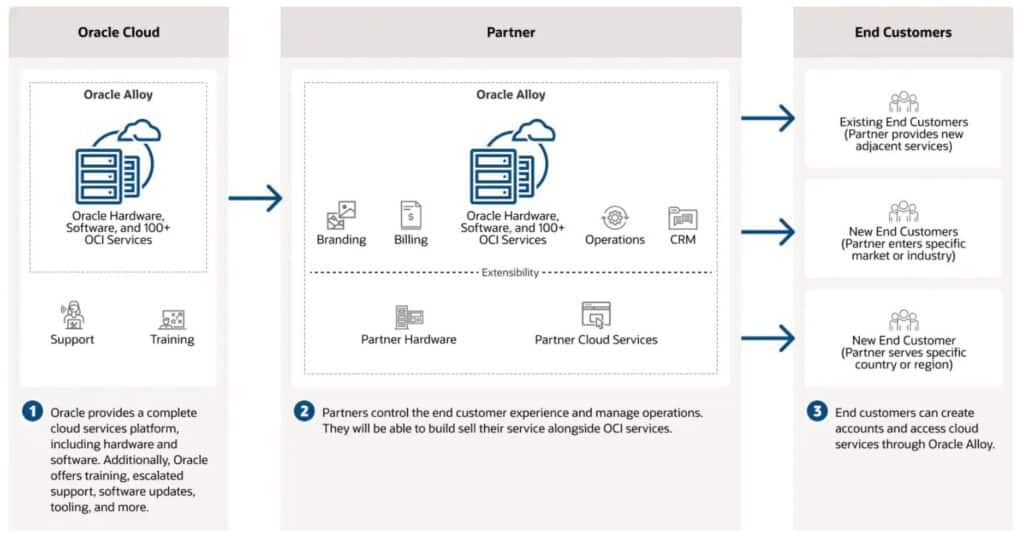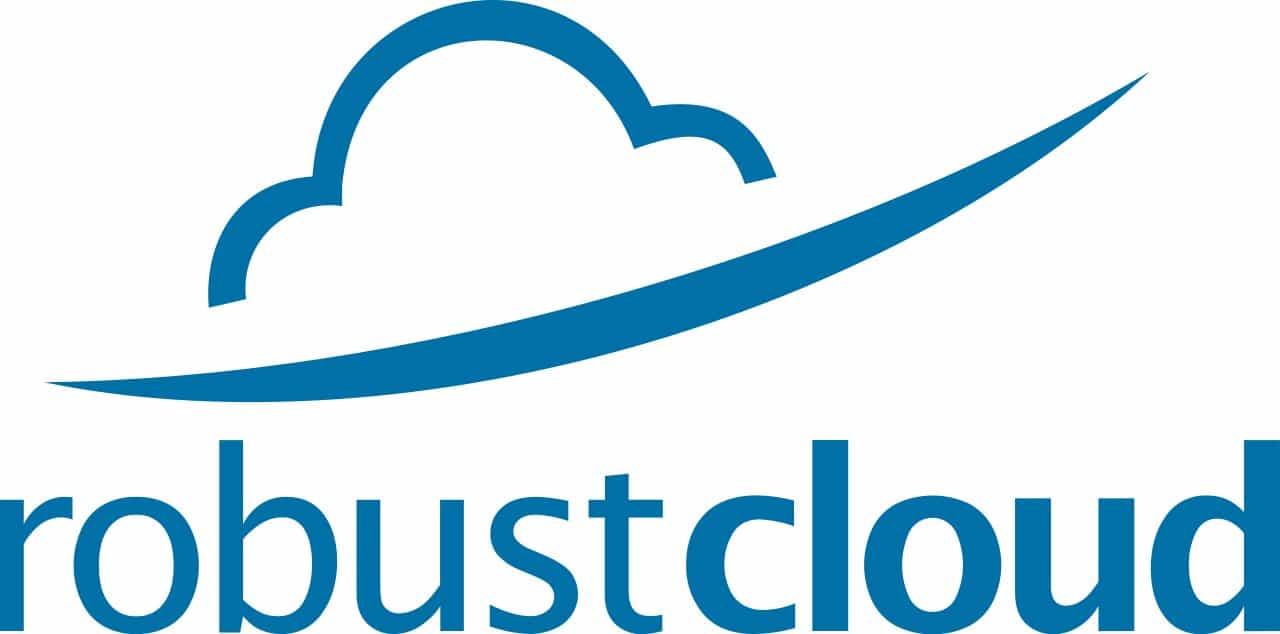Oracle had its annual CloudWorld and JavaOne conferences in Las Vegas from October 17th to October 23rd, with thousands of attendees attending in person and virtually. This blog post starts with a deep dive into Oracle Alloy, its implications on various stakeholders, and a summary followed by other enhancements announced across Oracle’s portfolio.

Oracle Alloy: Oracle is enabling partners to become cloud providers, brand and tailor the experience, and package new value-added services and applications to meet customers’ specific needs in their markets and industry verticals.
To understand why Oracle is moving in this direction, it is essential to look at when Oracle embarked on the public cloud service journey.
Oracle started later than other public cloud service providers in building an infrastructure for cloud services. Starting with a clean slate in a market where investments have already been made, and the moving market provides benefits and challenges.
The benefits of starting late in an infrastructure market are:
1. The newcomer can learn from established approaches and architect the solution with lessons learned by other providers. Oracle architected OCI with the help of technology leaders hired from existing cloud infrastructure providers.
2. In a field where technology is constantly changing, the architecture of an infrastructure built from scratch can leverage new technology. Oracle leveraged cloud native technology that became popular after Docker and Google open-sourced the container runtime and Kubernetes orchestration engine.
The challenges of arriving late in the market:
1. The established cloud service providers have already gained momentum and have many customers using the services. Oracle is behind competitors in the number of start-ups using OCI.
2. Hiring talent could be a challenge for newcomers. Oracle overcame this hurdle by using its deep pockets to attract talented staff.
3. The breadth and depth of services are behind competitors’ offerings. Oracle is catching up with several new OCI services.
Governments, systems integrators, and ISVs expect the ability to stand up an infrastructure independent of the public cloud and built on modern cloud technologies. Complete control of the infrastructure gives these entities the ability to fine-tune the environment to meet the changing demands of users. The announcement of Alloy aims to address the needs of these entities and cater to the following market dynamics:
1. The demand for multi-cloud across geographies. Regulatory restrictions and low latency requirements drive expectations that data is stored at the most appropriate location. Oracle Alloy allows service providers to meet all the needs of data sovereignty.
2. The investment in developing and delivering a cloud infrastructure service. Providing cloud infrastructure services from scratch requires a massive investment beyond just building data centers. There are challenges in building a complete software, hardware, and network infrastructure to work together, combined with developing billing systems to charge users. Oracle Alloy allows various entities to leverage Oracle’s experience in providing customers with a packaged cloud native architecture.
3. Getting locked in. Although sizeable public cloud service providers can be easy to use, the ability to quickly move workloads out of one provider is complex. Egress fees throw a monkey wrench into the ability to predict the costs of utilizing public cloud services. While customers can get locked into OCI, the control of Oracle Alloy allows customers to migrate to another open infrastructure a little more easily.
Implications for customers:
Oracle Alloy will benefit from different types of partners using Oracle Cloud. This will lead to product feedback from solutions deployed in various scenarios. This feedback will enable Oracle Cloud to continue to improve and lead to a better customer experience. New customers can use OCI purchased directly or through Oracle and deploy it in any environment. This will increase adoption for customers who require the cloud experience with OCI deployed in any on-premises or hosted environment. Edge deployments will also increase.
Implications to competitors:
If more partners jump on the OCI bandwagon and use Oracle Alloy, competitors will be forced to offer a similar deal. This could increase revenue in multi-cloud deployments but reduce the uniqueness of primary cloud service provider public offerings.
Implications to investors:
Oracle Alloy can accelerate the OCI platform’s growth through new market routes. Depending on how fast partners embrace the OCI platform, other public cloud providers may face headwinds and grow at lower rates than in the past. Opening the Oracle application platform to customers can create new avenues of revenue for Oracle.
Summary:
As a result of a late start, OCI is a cloud infrastructure platform built on modern cloud native technology, including containers and microservices. Oracle Alloy has the potential to indirectly expand its customer footprint using a range of partners, from governments and telecommunication providers to Global Systems Integrators (GSIs) and Independent Software Vendors (ISVs). Oracle has a large footprint of enterprise customers and a sales engine that can execute to deliver Oracle Alloy. Overall, Oracle announcements at Oracle CloudWorld 2022 bring new benefits to customers across its portfolio, expanding its total addressable market for solutions.
Other Announcements:
Oracle B2B Commerce Connectivity: Banking and logistics are core processes of B2B Commerce, and connecting external parties is complex. Oracle uses a standard data model to connect JP Morgan and FedEx for payment processing and logistic operations. If this initiative successfully delivers digital efficiencies, it will likely draw more companies into the ecosystem.
NVIDIA Partnership: With its leadership in accelerated computing instances and associated software, NVIDIA brings unique AI-related benefits to OCI customers through this partnership. OCI customers benefit from end-to-end AI development with NVIDIA AI Enterprise’s library of frameworks. By leveraging Apache Spark, NVIDIA RAPID handles the need to process large amounts of data reducing the time taken for data loading and pre-processing. Oracle acquired Cerner because healthcare is inefficient and can use a dose of technology to optimize processes. NVIDIA Clara, coming to Oracle Cloud, is a single platform to help healthcare innovation in medical imaging, genomics, natural language processing, and drug discovery. Overall, this partnership benefits Oracle with access to NVIDIA’s AI leadership, and NVIDIA gets access to Oracle customers.
Oracle Invites Customers and Partners to Build on Its Applications Platform: The value of a platform is measured by adjoining applications running on the same platform. These applications solve unique problems with functionality not covered by the application vendor. Running on the same platform provides the new application to enjoy a shared infrastructure, data, and security model. This announcement allows customers to quickly build specific solutions that could be single-use applications, such as a marketing campaign. Partners can create solutions that can be sold on the Oracle Marketplace, giving these solutions broad exposure and the ability to gain new customers.
MySQL Heatwave: A lot has been written about MySQL Heatwave’s technical benefits and throughput. The differentiator for customers is that MySQL Heatwave can run on Amazon Web Services (AWS) and Microsoft Azure. Customers running workloads on either of these platforms can use MySQL Heatwave to process data where it is stored and avoid ingress/egress fees. Oracle would benefit by adding the availability of MySQL Heatwave on the Google Cloud Platform.
Expanding App Development Portfolio: To reduce the complexity of managing a Kubernetes environment, Oracle announced Virtual Nodes to deliver a serverless experience. The OCI Queue is a fully managed serverless messaging service based on open standards. Customers can create and execute application logic with a graphical flow designer using OCI Workflow. Together these services provide developers with a rich set of capabilities to accelerate the development and delivery of new solutions.
